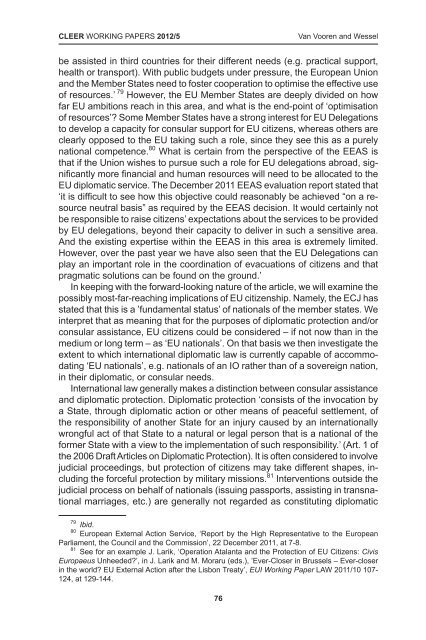Principles and practices of EU external representation - TMC Asser ...
Principles and practices of EU external representation - TMC Asser ...
Principles and practices of EU external representation - TMC Asser ...
You also want an ePaper? Increase the reach of your titles
YUMPU automatically turns print PDFs into web optimized ePapers that Google loves.
CLEER WORKING PAPERS 2012/5<br />
Van Vooren <strong>and</strong> Wessel<br />
be assisted in third countries for their different needs (e.g. practical support,<br />
health or transport). With public budgets under pressure, the European Union<br />
<strong>and</strong> the Member States need to foster cooperation to optimise the effective use<br />
<strong>of</strong> resources.’ 79 However, the <strong>EU</strong> Member States are deeply divided on how<br />
far <strong>EU</strong> ambitions reach in this area, <strong>and</strong> what is the end-point <strong>of</strong> ‘optimisation<br />
<strong>of</strong> resources’? Some Member States have a strong interest for <strong>EU</strong> Delegations<br />
to develop a capacity for consular support for <strong>EU</strong> citizens, whereas others are<br />
clearly opposed to the <strong>EU</strong> taking such a role, since they see this as a purely<br />
national competence. 80 What is certain from the perspective <strong>of</strong> the EEAS is<br />
that if the Union wishes to pursue such a role for <strong>EU</strong> delegations abroad, significantly<br />
more financial <strong>and</strong> human resources will need to be allocated to the<br />
<strong>EU</strong> diplomatic service. The December 2011 EEAS evaluation report stated that<br />
‘it is difficult to see how this objective could reasonably be achieved “on a resource<br />
neutral basis” as required by the EEAS decision. It would certainly not<br />
be responsible to raise citizens’ expectations about the services to be provided<br />
by <strong>EU</strong> delegations, beyond their capacity to deliver in such a sensitive area.<br />
And the existing expertise within the EEAS in this area is extremely limited.<br />
However, over the past year we have also seen that the <strong>EU</strong> Delegations can<br />
play an important role in the coordination <strong>of</strong> evacuations <strong>of</strong> citizens <strong>and</strong> that<br />
pragmatic solutions can be found on the ground.’<br />
In keeping with the forward-looking nature <strong>of</strong> the article, we will examine the<br />
possibly most-far-reaching implications <strong>of</strong> <strong>EU</strong> citizenship. Namely, the ECJ has<br />
stated that this is a ’fundamental status’ <strong>of</strong> nationals <strong>of</strong> the member states. We<br />
interpret that as meaning that for the purposes <strong>of</strong> diplomatic protection <strong>and</strong>/or<br />
consular assistance, <strong>EU</strong> citizens could be considered – if not now than in the<br />
medium or long term – as ‘<strong>EU</strong> nationals’. On that basis we then investigate the<br />
extent to which international diplomatic law is currently capable <strong>of</strong> accommodating<br />
‘<strong>EU</strong> nationals’, e.g. nationals <strong>of</strong> an IO rather than <strong>of</strong> a sovereign nation,<br />
in their diplomatic, or consular needs.<br />
International law generally makes a distinction between consular assistance<br />
<strong>and</strong> diplomatic protection. Diplomatic protection ‘consists <strong>of</strong> the invocation by<br />
a State, through diplomatic action or other means <strong>of</strong> peaceful settlement, <strong>of</strong><br />
the responsibility <strong>of</strong> another State for an injury caused by an internationally<br />
wrongful act <strong>of</strong> that State to a natural or legal person that is a national <strong>of</strong> the<br />
former State with a view to the implementation <strong>of</strong> such responsibility.’ (Art. 1 <strong>of</strong><br />
the 2006 Draft Articles on Diplomatic Protection). It is <strong>of</strong>ten considered to involve<br />
judicial proceedings, but protection <strong>of</strong> citizens may take different shapes, including<br />
the forceful protection by military missions. 81 Interventions outside the<br />
judicial process on behalf <strong>of</strong> nationals (issuing passports, assisting in transnational<br />
marriages, etc.) are generally not regarded as constituting diplomatic<br />
79 Ibid.<br />
80 European External Action Service, ‘Report by the High Representative to the European<br />
Parliament, the Council <strong>and</strong> the Commission’, 22 December 2011, at 7-8.<br />
81 See for an example J. Larik, ‘Operation Atalanta <strong>and</strong> the Protection <strong>of</strong> <strong>EU</strong> Citizens: Civis<br />
Europaeus Unheeded?’, in J. Larik <strong>and</strong> M. Moraru (eds.), ’Ever-Closer in Brussels – Ever-closer<br />
in the world? <strong>EU</strong> External Action after the Lisbon Treaty’, <strong>EU</strong>I Working Paper LAW 2011/10 107-<br />
124, at 129-144.<br />
76

















